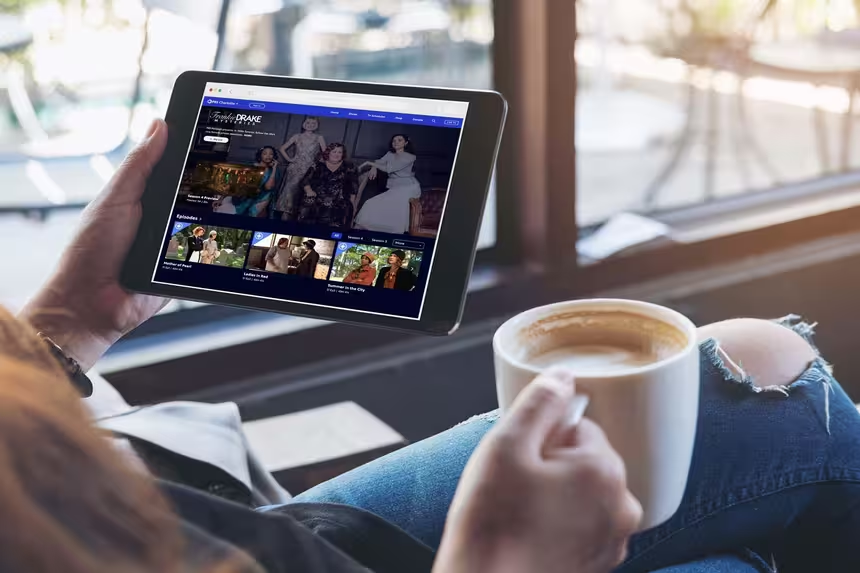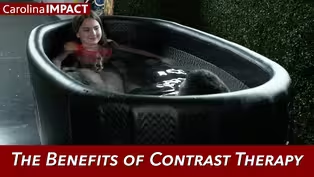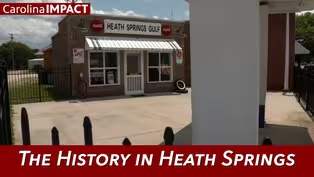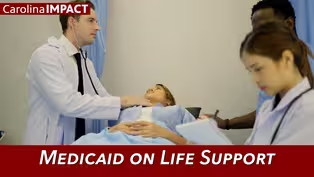
What's Next For LIFESPAN? | Carolina Impact
Clip: Season 12 Episode 1224 | 7m 40sVideo has Closed Captions
LIFESPAN Services, helping those with IDD Intellectual and/or developmental disabilities.
LIFESPAN Services began in Charlotte in 1973, when CMS was unable to help five special needs students. The organization has grown to become one of the areas leaders in assisting people with IDD - Intellectual and developmental disabilities. How does it work? What to they do? and how to they assist clients in finding employment?
Problems playing video? | Closed Captioning Feedback
Problems playing video? | Closed Captioning Feedback
Carolina Impact is a local public television program presented by PBS Charlotte

What's Next For LIFESPAN? | Carolina Impact
Clip: Season 12 Episode 1224 | 7m 40sVideo has Closed Captions
LIFESPAN Services began in Charlotte in 1973, when CMS was unable to help five special needs students. The organization has grown to become one of the areas leaders in assisting people with IDD - Intellectual and developmental disabilities. How does it work? What to they do? and how to they assist clients in finding employment?
Problems playing video? | Closed Captioning Feedback
How to Watch Carolina Impact
Carolina Impact is available to stream on pbs.org and the free PBS App, available on iPhone, Apple TV, Android TV, Android smartphones, Amazon Fire TV, Amazon Fire Tablet, Roku, Samsung Smart TV, and Vizio.

Introducing PBS Charlotte Passport
Now you can stream more of your favorite PBS shows including Masterpiece, NOVA, Nature, Great British Baking Show and many more — online and in the PBS Video app.Providing Support for PBS.org
Learn Moreabout PBS online sponsorshipWell, if you know anyone looking for a job these days, you know it's tough.
Between all the job sites, algorithms, and gatekeepers, most jobs seekers say they feel like they're applying into a black hole.
But imagine how much harder it could be if you are at a real disadvantage.
"Carolina Impact's" Jason Terzis joins us with more.
- In the United States, The average job search tends to last about five months or so, which is actually not too bad when you consider a significant portion of openings are never publicly advertised, or already filled Internally when they are advertised.
And get this.
It's estimated that 75% of resumes and applications are rejected by computers, applicant tracking systems, before hiring managers even lay an eye on 'em.
If it's that hard for the average person to land a job, imagine how hard it is for someone at a disadvantage.
(rapid whooshing) (upbeat music) It's another day on the job for Ben Steinman at the subway on Eastway Drive in Charlotte, wiping down tables and chairs and sweeping the floors, all necessities in the food service industry.
What do you do here?
- Clean the tables, your toilets, back there.
Sweep, sweep the table, sweep, sweep.
- [Jason] You help keep the place clean.
- Right.
- [Jason] It's a job Ben has been doing quite a while now.
- Six years.
- [Jason] Six years?
- Yes.
- [Jason] You've been here for six years?
I'm assuming you like it.
- Yeah, I like it a lot.
- We hope Ben never stops working here, honestly.
- [Jason] Ben has what's known as an IDD, an intellectual and/or developmental disability, specifically fragile X syndrome, which is a genetic condition.
But through his work ethic and personality, Ben's grown to be a big part of the Subway family.
- Ben's been like family ever since, like a little brother to me, honestly.
Right, Ben?
- I like you.
- He's always very happy.
And he works hard in here.
If he makes a mistake, he apologizes every single time, even when he doesn't need to.
- [Jason] Subway owner, Drew Hawkins, took a chance on Ben and it's worked out.
- You can't judge a book by its cover, first of all.
You have to give people a chance.
- [Jason] Unfortunately though, not nearly enough employers do.
- Of adults ages 21 to 64 who have an IDD and want to work and can work, only 34% of them are able to find jobs.
We have to educate the employers in the market that there's a whole sector of people here who wanna work, and can work, and will be the best employee that you hire.
You just need to be aware that they're there.
- [Jason] IDD refers to those with Down syndrome, autism, cerebral palsy, and other mental or physical disabilities - In the state of North Carolina, it is estimated that almost 200,000 individuals are diagnosed with IDD.
And of those 200,000, only about 17 to 18,000 receive the services that they deserve and need.
- [Jason] And that's where Lifespan Services comes in.
- We help children and adults with intellectual and developmental disabilities live, work, and play in their communities.
- We're helping individuals who have been told their whole life that they're the least and the last.
They have been discriminated against because of their differing abilities.
But Lifespan comes along and says let's illuminate your abilities.
What are you good at?
What do you want to do?
And so, our team works with them to figure out what their gifting is, what their expertise is.
So it gives them a purpose.
It gives them a life.
- [Jason] The lifespan story is one that dates back more than 50 years.
- Lifespan was birthed out of necessity.
Back in 1973, there were five kids in the Charlotte School system with differing abilities who were unable to get the education they needed.
- [Jason] Members from St. Mark's Lutheran Church created an educational day program to help those students.
- A gentleman named Lee Derby heard about it.
And he worked with St. Mark's Lutheran Church.
And Lee Derby and the church took those five students, picked them up every day in a Volkswagen white and red bus, and took them to a Sunday school room and delivered the education that they deserved and needed.
- 'cause we're called Lifespan because we helped throughout the entire lifespan.
So literally from six weeks old until whenever, (laughs) until it's that time, so their entire life.
- [Jason] Today, Lifespan serves about 1500 individuals across 23 North Carolina counties, including eight creative campuses, three inclusive childcare facilities, and nine group homes.
- We also have residential facilities where individuals live with us and they're cared for 24/7.
- [Jason] At the Lifespan Creative Campus, Center City, individuals enjoy various art and horticulture programs.
- You can learn yourself in Lifespan.
I feel excited to be here.
- When we do that and provide that service, we are also providing respite for their parents or guardians.
And so, while their individual, their son, their daughter, their niece, or their nephew is with Lifespan, they are able to go out.
And mom or dad are able to keep their jobs.
- [Jason] Lifespan also pairs individuals with life coaches with the ultimate goal of finding and keeping a job.
- You give Lifespan a chance because they're confident enough to bring their client out here.
And I was willing to give him a chance.
And he proved me to be fortunate.
- [Jason] Lifespan was just one of several organizations recently taking part in the second annual Abilities Employment Symposium.
- I was here last year.
It was probably around 100.
We're at 250, 300 folks today, which is amazing.
Amazing.
The more that we're exposed to understanding how we can do this together, the better off we are as a community, plain and simple.
There's a lot of fear factors, a lot of things people don't understand.
Well, you bust down all those walls just by attending events like this.
- [Jason] The symposium featured networking, school and job training programs, and perhaps most important of all, mock interviews for individuals to practice their skills.
- What do you like best about working there?
What's your favorite thing about working there?
- Greet the... Greet the customers.
- Greeting the customers, okay.
- Mock interviews, how cool is that to get a chance to do a mock interview?
Practice while you're here.
Learn that you need to smile.
I've heard that 5 million times out there.
As long as I wear my smile, I can get the job.
Well, I'm gonna believe in that too, right?
- [Jason] The goals are education, enrichment, and employment.
But a good portion of Lifespan's mission is simply changing people's perspectives about those with IDD, - We see someone coming down the sidewalk in a wheelchair, we will subliminally and literally cross the road and go down the other side of the sidewalk because we don't want to engage, why?
'Cause we don't know how.
We don't know what to say.
But my point here is in telling the story, be part of the story.
Interact with somebody who has an IDD.
Speak to that person in a wheelchair.
Call them by their name.
Don't talk about their disability.
Don't diss their ability.
But just invite them in and say, "Hey, how you doing?
Where are you going?
What are you doing today?"
Thats the kind of story that changes lives.
- So I'm a huge fan of Lifespan.
They do amazing work throughout this area.
What else did you uncover when working on this story?
- Well, like most nonprofits, lifespan relies heavily on individual giving, with 63% of its funding coming from personal donations and just 7% from corporate sponsorships.
The other 40% is made up of grants through the city, county, state, and federal governments.
But as we've been talking about it, and it's so much in the news lately, with all the potential cuts to federal government, and budgets, and nonprofits, they could be losing some funding, as so many other nonprofits.
So they're running the risk of that.
And kinda waiting to see what happens there in the federal government.
April 29, 2025 Preview | Carolina Impact
Preview: S12 Ep1224 | 30s | Medicaid on Life Support, What's Next For LIFESPAN, Benefits of Contrast Therapy, & Heath Springs (30s)
The Benefits of Contrast Therapy | Carolina Impact
Video has Closed Captions
Clip: S12 Ep1224 | 5m 16s | Learn the benefits of contrast therapy. (5m 16s)
The History in Heath Springs | Carolina Impact
Video has Closed Captions
Clip: S12 Ep1224 | 5m 48s | Heath Springs, SC – A small town with historic charm and opportunity. (5m 48s)
Medicaid on Life Support | Carolina Impact
Video has Closed Captions
Clip: S12 Ep1224 | 6m 38s | Medicaid cuts threaten healthcare access for 2 million NC residents, reshaping lives (6m 38s)
Providing Support for PBS.org
Learn Moreabout PBS online sponsorship
- News and Public Affairs

Top journalists deliver compelling original analysis of the hour's headlines.

- News and Public Affairs

FRONTLINE is investigative journalism that questions, explains and changes our world.












Support for PBS provided by:
Carolina Impact is a local public television program presented by PBS Charlotte



